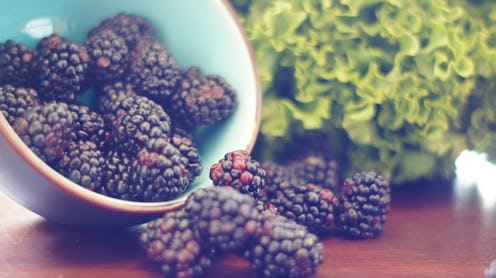Life
8 Signs You May Need More Variety In Your Diet

When it comes to eating healthy, we know that eating kale is good for us, but it can be hard to tell how healthy our diet is overall. You can be eating good foods but if your meals aren't balanced, you may be exhibiting signs you need more variety in your diet. Picking the right foods is the first step, but making sure you're switching up veggies and eating meals that include all food groups is just as important.
If you suspect your diet isn't all that great, you aren't alone. According to research from Prevention, about half of Americans are concerned they aren't getting enough nutrients in their diet, and over 20 percent have already been told by a doctor that they have a nutrient deficiency. Looking at dietary guidelines and nutrition labels can help, but most people can't really tell how much fiber is in their quinoa salad when they're actually making it.
Because it can be hard to gauge your diet without intense analysis, you can look for certain clues that you may need to switch your meals up by gauging what your food looks like and how your body and mind feel. To help guide you, I consulted with a few nutritionists to explain what signs indicate that you need more variety in your diet.
1. You Eat The Same Meals Over And Over Again
We are creatures of habit, and sometimes we get stuck making our go-to meals because they're easy and convenient. "This can lead to deficiencies, especially if your meals do not include enough essential nutrients — especially nutrients that have been pinpointed as nutrients of concern, including fiber, vitamin D, calcium, and iron," says Toby Amidor, MS, RD over email.
2. You're Tired And Stressed
"While stress is an inevitable part of life, how we plan our daily meals can directly affect our body’s response," says Abby Sauer, RD, MPH, a registered dietician specializing in adult nutrition for Abbott, over email. "Foods rich in anti-inflammatory compounds such as unsaturated fatty acids (like salmon and tuna), antioxidants, polyphenols and carotenoids (like dark chocolate, green leafy vegetables, bright-colored peppers and wine) lower the levels of inflammation in the body and increase your mental capabilities to handle life’s curveballs."
3. You Hate Fruits And Veggies
"Even though they may be some of our favorite foods the refined carbohydrates in pasta, white bread, and many snack foods have been stripped of any many nutrients during processing and add little nutritional value to your diet," says Sauer. "Try to incorporate at least one serving of fruits or vegetables in your daily meals, which can be as easy as unthawing a bag of frozen green beans or slicing up an apple."
4. Your Plate Is All One Color
"You want colors popping out of your plate," says Amidor. "As you increase your color scheme on your plate, the more you’re expanding the variety of vitamins, minerals, and phytonutrients — plant chemicals that prevent and fight disease — you are eating."
5. You Eat All Carbs
Pasta is an easy dish to make, but you don't want to overdue it. "Many folks don’t realize they eat many more carbs than they think," says Amidor. "You shouldn’t go carb-free, but you do want to eat the right types carbs in your diet, such as whole grains."
6. You Turn To Packaged Snacks
"Snacks are mini-meals and should provide nutrients you may not be getting during regular meals," says Amidor. "Many people just eat a fruit or a packaged snack, but you should aim for at least 2 different foods groups within your snack, for example Greek yogurt and strawberries."
7. You're Frequently Thirsty
You may not realize it, but thirst could be a sign that you're eating too much of the wrong foods such as processed foods filled with salt. "Fruits are filled with water, and so are some vegetables," says Shari Portnoy, MPH, RD, CFT, EMT over email. "Chances are that you aren't eating enough of them."
8. You Skip Meals Most Of The Day
Some of us are so busy during the day that fitting in a meal isn't a priority. By the time we have a moment to eat, we are ravenous and crave different things. "Chances are that you are very hungry when you finally do eat, so you eat whatever is easiest or closest," says Portnoy. Keep snacks like nuts or fruit on hand if this is the case, as you'll want to make sure you're eating throughout the day.
When in doubt, make sure to eat something from each food group at every meal, and always load up on the most whole, unprocessed foods.
Images: Pixabay (9); Pexels